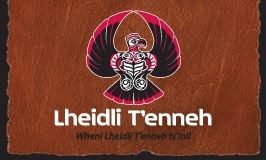Another area First Nation, the Nak'azdli Whut'en in Fort St. James, is voicing concerns regarding the proposed Lheidli T'enneh treaty which will go before a vote in June.
Along with the McLeod Lake Indian Band and the Simpcw First Nation, the Naz'azdli Whut'en says it will also suffer the effects of the proposed treaty.
"This will affect our communities yes, but it will affect many more," says Nak'azdli Chief Alec McKinnon. "All First Nations should be concerned about this."
All three bands are searching for answers regarding the historic relationship Lheidli T'enneh has on their traditional territorial claims.
"They have entered this treaty but they have not provided a strength of claim to the territory but when it comes to non-treaty communities, they do have to provide strength of claim. This is so one-sided," McKinnon said. "I believe all of these communities need to look at this decision and see how it affects them. For Nak'azdli, we are at the headwaters of the Stuart Lake. And now with this treaty, Lheidli T'enneh will be able to harvest without discussing with us and here we have been, trying to be conservative in restocking the salmon."
This "lack of consultation" is what has Nak'azdli Whut'en and other First Nation communities concerned.
"Before they sign, I would like to see Lheidli T'enneh and the federal and provincial governments consult with Nak'azdli regarding areas of concern which means possibly pushing back boundaries," McKinnon said. "This treaty could affect our fish population. We have no place for negotiation when it comes to discussing a harvesting plan. And this also means we will not be involved when it comes to moose, bear and fish populations. They will have all the rights to harvest and we won't. It puts them at an advantage and we aren't a part of it."
The agreement between the Lheidli T'enneh and the provincial and federal governments would see 4,300 hectares of land fall under Lheidli T'enneh ownership. The band would also receive a $37 million capital transfer and maintain traditional hunting and fishing rights. They will also have opportunities to pursue economic endeavors in forestry, agriculture and resource extraction.
The proposed treaty does contain provisions regarding overlapping land claims.
Simpcw First Nation Chief Nathan Matthew told The Citizen recently that the agreement is inconsistent with the principles of reconciliation and with the United Nations Declaration on the Rights of Indigenous Peoples.
The agreement has also been considered non-traditional.
"It is based on rules that will only create a barrier," says Pete Erickson, a hereditary chief from Nak'azdli Whut'en who holds the same title of Ts'oh Dai as Chief Kwah did over 200 years ago.
"Even though we are all from the Dakelh people, why have we no say? A treaty will make it impossible to overcome things such as residential schooling and the reserve system. This is detrimental and a treaty like this will make it impossible to heal as a nation. Our traditions cannot be healed by a treaty. We are of the Dakelh people meaning that we travel by water. Back in the day, there were never any boundaries. We restocked our salmon, moose and caribou. But today, with these rules, this will be hard."
According to McKinnon, Nak'azdli territory has always been open to sharing with neighboring communities throughout tough times including periods of overhunting.
"We've always shared. And it is our ancestral right to hunt and gather. This should be taken into consideration," McKinnon said. "Our custom includes the potlatch system. This is our governing system. First Nations following the treaty are giving up their customs and this is disrespectful not only to us but to our ancestors. We've never lost our territory to war, never ceded or extinguished our rights. We have only used our ancestral lands to sustain our families. This is complete disregard from the Crown for our rights to our territory."
Carrier Sekani Tribal Council's Deputy Tribal Chief, Reg Mueller, says that the tribal council is also in negotiations with the province as a group.
"On behalf of the Tribal Council, we have to respect each other's positions, all First Nation communities and all of their decisions. We respect Leidli T'enneh and wish them the best."
Lheidli T'enneh Chief Dominic Frederick told The Citizen he plans to strengthen relationships with neighbouring First Nations but the treaty ratification process will still go to members for a vote on June 16-23.



